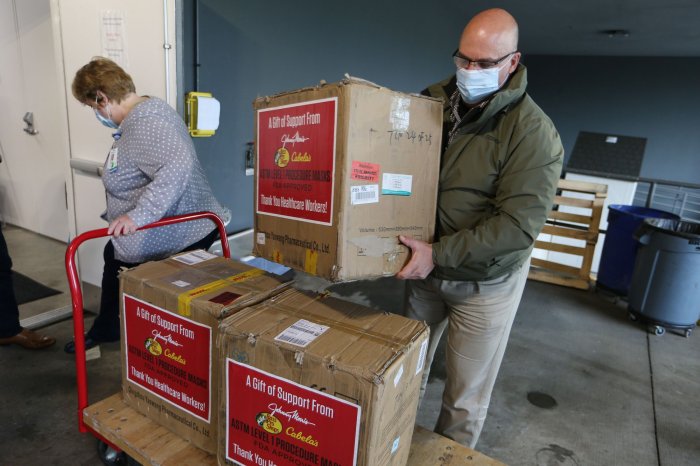A voter casts a ballot in the Ohio primary election while observing social-distancing Tuesday. Photo by Aaron Josefczyk/UPI |
License Photo
April 30 (UPI) -- Individual states expect to spend tens of millions more on elections this year as a result of the coronavirus pandemic, an analysis of five key states released Thursday indicates.
The study, spearheaded by New York University's Brennan Center for Justice, found that though the federal government provided $400 million in grants to help states run their elections, the amount isn't enough to adjust for the increased costs.
"The coronavirus pandemic has changed voting behavior and poses an extraordinary challenge to state and local officials as they seek to ensure that elections in 2020 are fair, safe and secure," a news release accompanying the study said.
The Brennan Center for Justice said "far more" voters are requesting mail-in ballots for elections this year and are registering online in higher numbers instead of visiting government offices to do so.
Additionally, local governments will have to invest in personal protective equipment and sanitation supplies to reduce the spread of COVID-19 among election workers and voters.
"Even if no rules change, the 2020 election will be costly," the Brennan Center said.
The study, conducted in part by the Alliance for Securing Democracy, the R Street Institute and the University of Pennsylvania's Institute for Cyber Law, Policy and Security, reviewed the election needs of five key states -- Georgia, Michigan, Missouri, Ohio and Pennsylvania.
"These five states have diverging election administration systems and needs, from the number of elections each will hold this cycle to their requirements for absentee voting," the release said.
Each will have between $60 million and $124 million in estimated COVID-19-related election costs, with Georgia bearing the biggest brunt of the pandemic.
State costs will rank between $42 million and $49 million for Georgia, with local jurisdictions expecting to spend an additional $68 million to $75 million.
In Michigan, local governments will need an extra $81 million to $86 million and the state will need between $13.5 million and $17.6 million. Missouri will need between $58.8 million and $66 million at the local level and between $600,000 and $800,000 at the state level. Ohio's local costs will range between $65.8 million and $77.8 million and the state expects to spend about $4 million. Finally, Pennsylvania's local governments will spend between $61.6 million and $72 million and the state will spend nearly $18 million.
The $400 million allocated to states for elections costs as part of the $2.2 trillion coronavirus stimulus signed March 27 will cover between less than 10 percent of what Georgia needs and 18 percent of what Ohio needs.
The researchers determined that states need more assistance developing the infrastructure needed to help changing voting behavior, whether that be registering online or voting by mail. Elections officials and voters also need PPE, the option for curbside voting and clean polling centers. Finally, funds will be needed to educate the public about voting changes, including the relocation of polling sites.
"From interviews with election officials and the vendors who must supply most of the products and services these officials need, it is clear that additional appropriations are necessary to fulfill the goal of free, fair and safe elections in 2020," the center said.
"Without funding from the federal government, there is little chance that state and local governments can shoulder the financial burden."
A Gallup poll released this week indicated about two-thirds of Americans expect the 2020 U.S. election to be disrupted by the coronavirus pandemic, which has prompted stay-at-home orders, restrictions on non-essential workers and an economic plummet.
Seventy percent of Americans favor allowing all registered voters to vote by mail.
There's been a growing push by some politicians to allow vote-by-mail to encourage continued social distancing during the spread of COVID-19. Some states allow only those physically unable to vote in person -- the disabled and elderly -- to vote by mail.
Bass Pro Shops marketing manager David Smith (R) carries a box of donated face masks into Mercy Health in Chesterfield, Mo., on May 13. The company is donating 1 million FDA-approved ASTM Level 1 Procedure Face Masks to healthcare workers and first responders working on the front lines of the pandemic. Photo by Bill Greenblatt/UPI |
License Photo
















